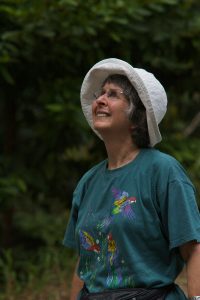Jan Dobb

Jan Dobb
Canberra, Australia
can’t stop grinning
at pink cherry blossoms
first grandchild
Congratulations on having your haiku selected as the top winner in the International category in the Vancouver Cherry Blossom Festival’s 2016 Haiku Invitational contest. How did you first learn about haiku, and how much writing of haiku or other poetry have you done?
Thank you. I was surprised and honoured to win the International category of the Vancouver Cherry Blossom Festival contest and I’m very grateful for the invitation to take part by submitting some haiku. It’s hard to say when I first learnt of “haiku” as such, as I’d been introduced to 5-7-5 syllables many years ago. Only in 2009, when I naively wrote some of these for an international competition, did I discover with surprise that the judges and winners seemed quite unaware of the 5-7-5 rule! So that’s when I began to explore further, reading. Haiku, no longer just a pretty little ditty, began to work its magic and I experimented with trying to write it. In September 2010 three of these attempts were published in Notes from the Gean. With that exciting encouragement, I was well and truly hooked! This year, I began to write tanka, but have written very little other poetry before now.
What was the inspiration for your winning poem?
The inspiration came from a friend who was overwhelmed with joy at the birth of her first grandchild. As we talked of this, the emotion of my similar experience returned as though yesterday—instead of twenty years ago! Just then the VCBF were inviting submissions of cherry blossom haiku and the emotional juxtaposition of grandchild and blossoms just seemed to fit the occasion.
Describe the moment when you first learned you had won.
When the email arrived, I assumed it was a circular notification of results, so of course I was keen to see if there was anyone I knew among the winners. It took a few moments to register that this was a message addressed to me! Then the yell I gave brought my husband down the corridor to see what was happening. My friend, of course, was thrilled that the arrival of her precious grandchild had prompted a prize!
Do you have favourite books or websites relating to haiku that others might benefit from in order to learn haiku as a literary art and to share one’s haiku?
That’s a hard question because there are really so many. Perhaps one of the best sources of essays I’ve found is the Archived Monthly Haiku Articles on the New Zealand Poetry Society website. Online haiku journals like A Hundred Gourds, Cattails, Wild Plum, and the like contain a pleasant range and a warm community spirit. Journals like Kokako and Presence are among my favourites in print. One of my favourite books, edited by Allan Burns, is Where the River Goes: The Nature Tradition in English-Language Haiku. But to name just a few seems to leave so many worthy ones out!
Please tell us more about yourself.
Language and writing have always been an interest. Since retiring from teaching and school library employment, I’ve enjoyed the challenge of researching, writing, and publishing family history, in an endeavour to animate in narrative the bland facts of formal records. Short stories have been fun to write and satisfying to send into the world. Currently I enjoy weekly meetings of two groups—reading Chaucer and reading Shakespeare together. Other interests and activities are walking, gardening, opera, and theatre.
How does where you live and what you enjoy doing affect the way you write haiku?
I have lived in Canberra for more than forty years and our three daughters grew up here. The environment of Canberra, Australia’s “bush capital,” affects very much the way I write haiku. The local bushland, with its gum trees, kangaroos, and views of the distant ranges, is an ever-present inspiration. Regular walks with notebook at the ready are part of my life and being.

